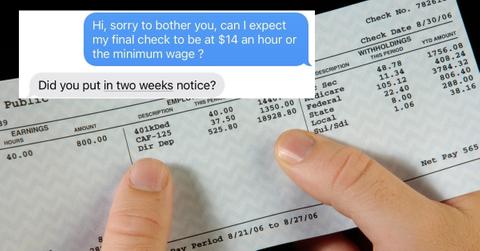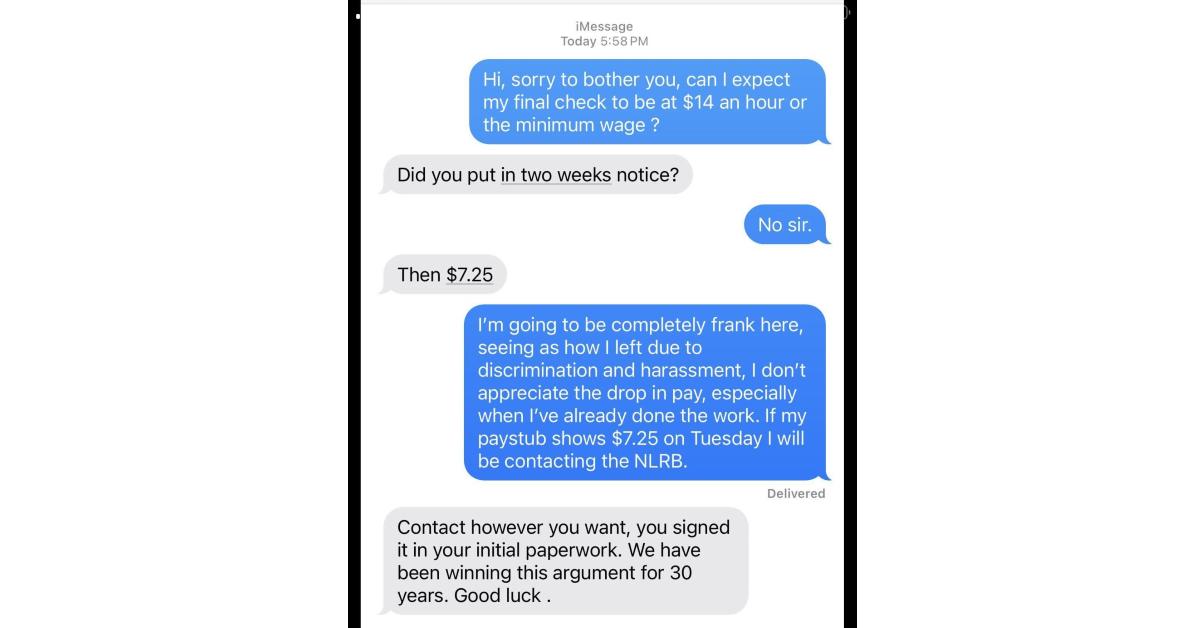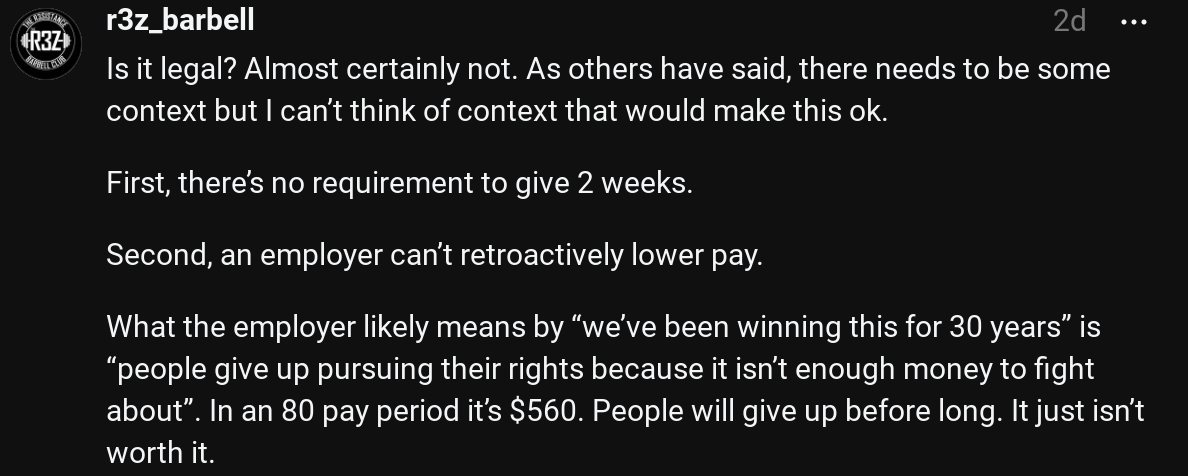Boss Reduces Worker’s Final Paycheck to Minimum Wage After They Didn’t Give 2 Weeks Notice
"Who cares… it’s like 200 bucks difference. If you left your job needing money that bad you should make better choices"
Published March 13 2024, 11:20 a.m. ET

Can an employer reduce the amount of money on your final paycheck if you fail to give 2 weeks' notice? Generally speaking, employers aren't allowed to retroactively deduct pay for an amount that is less than what the agreed-upon hourly rate is for employees.
However, there are law firms that have state-specific employment contracts/agreements that state that there are financial consequences for not handing in two weeks' notices may complicate matters for employees looking to seek lost damages for getting their pay reduced.
This very phenomenon became the topic of debate in an Instagram threads post uploaded by Emmanuel Etika (@shady_et) who showcased a screenshot conversation on the application.

"Hi sorry to bother you, can I expect my final check to be at $14 an hour or the minimum wage ?" the message from the employee reads to who is presumably a supervisor at their now former place of employment.
The supervisor asks: "Did you put in two weeks notice?"
"No sir." the worker responds.
"Then $77.25," their manager tells them, indicating that there's some type of policy for employees getting their pay docked to a minimum hourly wage if they don't hand in their 2 weeks notice before leaving the position.
The worker, who was on-boarded for $14/hr, took issue with the fact that they were now getting paid around half of what they would've otherwise gotten had they put in their 2 weeks notice and threatened legal action and that they would report the business for unfair compensation practices as a result of the deduction.

"I'm going to be frank here, seeing as how I left due to discrimination and harassment, I don't appreciate the drop in pay, especially when I've already done the work. If my paystub shows $7.25 on Tuesday I will be contacting the NLRB," that last acronym, for the uninitiated, refers to the National Labor Relations Board.
According to the organization's website, it is "an independent federal agency vested with the power to safeguard employees' rights to organize and to determine whether to have unions as their bargaining representative. The agency also acts to prevent and remedy unfair labor practices committed by private sector employers and unions."
Judging from the supervisor's response to the employee's text, however, it didn't seem like they were all too concerned with their NLRB warning, however: "Contact however you want, you signed it in your initial paperwork. We have been winning this argument for 30 years. Good luck ."

Shady, who posted the screen capture of the conversation, questioned in a caption for the post: "is this legal?"
Commenters who responded to the Threads post had varying opinions, there was one user who thought that posting the screen-capped conversation out of context made it difficult to accurately assess the situation.
"I don't understand. Was he getting paid $14/hr before quitting? Also, why defend someone who didn't give two weeks' notice? Too many unknown facts to take sides," they wrote.
There was another commenter who seemed to side with the employer's point of view, writing: "The point everyone who is saying 'this is not legal' is missing is the fact that he quit didn’t put in 2 weeks. Therefor leaving the employer without an employee. Most employers do this."

They added, "If you quit they can lower the wage as repercussion because you just left. It sounds like the person didn’t read their new hire paperwork stating this. Hence why the employer says “we been winning this for 30 years”
Someone else expressed how they thought the worker was "entitled" without giving their two weeks notice: "I don’t get why there are people making the claim to go after the employer or 'let the internet do its job' you quit without giving your employer two weeks notice. When I started working in my teens if you did that you didn’t expect to receive your last weeks cheque, that was a risk you took. Entitled world we live in now."
However some argued that this type of behavior from the worker's employer certainly wasn't legal and that they should, by no means, subject their workers to this kind of treatment: "Is it legal? Almost certainly not. As others have said, there needs to be some context but I can’t think of context that would make this ok. First, there’s no requirement to give 2 weeks.Second, an employer can’t retroactively lower pay."

They continued, "What the employer likely means by “we’ve been winning this for 30 years” is “people give up pursuing their rights because it isn’t enough money to fight about”. In an 80 pay period it’s $560. People will give up before long. It just isn’t worth it."
And then someone else said that any business that pays its workers minimum wage probably shouldn't be in business, to begin with: "Anyone paying $7.25 an hour doesn’t deserve to be in a business that requires employees. I don’t know if it’s legal or not. My guess is it is legal because low-wage workers get screwed in every possible way. Legal or not, whoever owns this company is exploiting low-wage earners’ desperate need for work of any kind. I despise people who do that. It’s disgusting."
What do you think? If the employee agreement dictates a worker's final pay period will be reduced minimum wage if they fail to give 2 weeks notice, does the responsibility to know the rest of the shoulders of the worker? Or should management pony up the money for those charges and give workers whatever agreed-upon rate they were initially hired at?